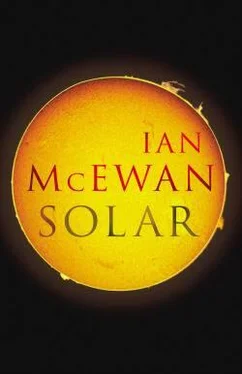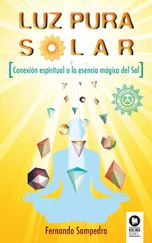He was hearing dismissive whispers from separate quarters of the room, which had begun, he thought, on his words 'warming the planet'. His nausea was rising, that bloated carcass within his own was odiously stirring. While listening to Saleel's introduction he had noticed that the velvet curtain behind him had a gap at its centre – an escape route he might just need. He stopped speaking, inhaled deeply, and made himself stand erect and gaze about the room, trying to identify the dissent. A lifetime of public speaking had taught him the value of the unembarrassed pause. He knew that the solid institutions of the City nurtured a vigorous culture of irrationalist denial, in the face of basic physics and years of good data. The deniers, like people everywhere, wanted business as usual. They feared a threat to shareholder value, they suspected that climate scientists were a self-serving industry, just like themselves. Beard felt towards them all the contempt of the recent convert.
As he drew breath to continue speaking, he experienced a fishy reflux rising from his gorge, like salted anchovies, with a dash of bile. He closed his eyes, swallowed hard, and changed tack.
'I read in yesterday's paper that in just four years' time we'll arrive at the bicentennial of Charles Darwin's birth, and the hundred and fiftieth anniversary of the first edition of The Origin of Species. The celebrations are bound to obscure the work of another great Victorian scientist, an Irishman named John Tyndall, who began a serious study of the atmosphere in that same year, 1859. One of his interests was light, which is why I feel a special affinity with him. He was the first to suggest that it was the scattering of light by the atmosphere that made the sky blue, and he was the first to describe and explain the hothouse or greenhouse effect. He built experimental equipment that showed how water vapour, carbon dioxide and other gases prevent the earth's warmth from the sun being radiated back out into space, and so make life possible. Remove this blanket of vapour and gases and, as he famously wrote' – Beard drew a card from the top pocket of his jacket and read – '"You would assuredly destroy every plant capable of being destroyed by a freezing temperature. The warmth of our fields and gardens would pour itself unrequited into space, and the sun would rise upon an island held fast in the iron grip of frost."
'By the beginning of the twentieth century it was known to a few that industrial civilisation was adding carbon dioxide to the atmosphere. In succeeding years it was understood precisely how a molecule of this gas absorbs and contains the longer wavelengths of radiant light and traps heat. The more carbon dioxide, the warmer the planet. In the nineteen sixties an unmanned satellite showed that our neighbour Venus has an atmosphere that is ninety-five per cent carbon dioxide. And it's more than four hundred and sixty degrees at the surface, hot enough to melt zinc. Without its greenhouse effect, Venus would have roughly the same temperature as the earth. Fifty years ago we were putting thirteen billion metric tons of carbon dioxide into the atmosphere every year. That figure has almost doubled. It's more than twenty-five years since scientists first warned the US government of anthropogenic climate change. In fifteen years there have been three IPCC reports of mounting urgency. Last year a survey of nearly a thousand peer-reviewed papers showed not one dissenting from the majority view. Forget sunspots, forget the Tunguska Meteorite of 1908, ignore the oil-industry lobbies and their think-tank and media clients who pretend, as the tobacco lobby has done, that there are two sides to this, that scientists are divided. The science is relatively simple, one-sided and beyond doubt. Ladies and gentlemen, the question has been discussed and investigated for a hundred and fifty years, for as long as Darwin's Origin of Species has been in print, and is as incontestable as the basics of natural selection. We've observed and we know the mechanisms, we've measured and the numbers tell the story, the earth is warming and we know why. There is no scientific controversy, only this plain fact. That may sadden you or frighten you, but it also should position you beyond doubt, free to consider your next move.'
The nausea came in on a fresh wave and threatened to disgrace him. He was sweating coldly, he was aching and weak in his spine. He had to keep talking to distract himself. And he had to talk fast. He was being pursued, he had to run.
'So,' he said, cracking the word through something glutinous in his throat. 'Allow me to make some suggestions. Collectively, according to my enquiries, your various organisations represent around four hundred billion dollars of investments. These are golden days in the global markets and sometimes it seems the party will never end. But you might just have overlooked one sector that is outperforming the rest by doubling every two years. You may have noticed, you may have turned away. Not quite respectable enough, a mere passing fashion, you may have thought, too many of those post-hippie plutocrats from Stanford involved. But also involved are BP, General Electric, Sharp, Mitsubishi. Renewable energy. The revolution has begun. The market will be even more lucrative than coal or oil because the world economy is many times bigger and the rate of change is faster. Colossal fortunes will be made. The sector is seething with vitality, invention – and, above all, growth. It has thousands of unquoted companies positioning themselves with new techniques. Scientists, engineers, designers are pouring into the sector. There are log jams in the patent offices and supply chains. This is an ocean of dreams, of realistic dreams of making hydrogen from algae, aviation fuel from genetically modified microbes, of electricity out of sunlight, wind, tides, waves, cellulose, household waste, of scrubbing carbon dioxide from the air and turning it into a fuel, of imitating the secrets of plant life. An alien landing on our planet and noticing how it was bathed in radiant energy would be amazed to learn that we believe ourselves to have an energy problem, that we ever should have thought of poisoning ourselves by burning fossil fuels or creating plutonium.
'Imagine we came across a man at the edge of a forest in heavy rainfall. This man is dying of thirst. He has an axe in his hand and he is felling the trees in order to suck sap from the trunks. There are a few mouthfuls in each tree. All around him is devastation, dead trees, no birdsong, and he knows the forest is vanishing. So why doesn't he tip back his head and drink the rain? Because he cuts trees expertly, because he has always done it this way, because the kind of people who advocate rain-drinking he considers suspicious types.
'That rain is our sunlight. An energy source drenches our planet, drives its climate and its life. It falls on us in a constant stream, a sweet rain of photons. A single photon striking a semiconductor releases an electron, and so electricity is born, as simple as that, right out of sunbeams. This is photovoltaics. Einstein described it and won a Nobel Prize. If I believed in God, I would say this is his greatest gift to us. Since I don't, I say how auspicious are the laws of physics! Less than an hour's worth of all the sunlight falling on the earth would satisfy the whole world's needs for a year. A fraction of our hot deserts could power our civilisation. No one can own sunlight, no one can privatise or nationalise it. Soon, everyone will harvest it, from rooftops, ships' sails, from kids' backpacks. I spoke of poverty at the start – some of the poorest countries in the world are solar rich. We could help them by buying their megawatts. And domestic consumers will love making power out of sunlight and selling it to the grid. It's primal.
'There are a dozen proven ways of making electricity out of sunlight, but the ultimate goal is still ahead, and this is close to my heart. I'm talking of artificial photosynthesis, of copying the methods nature took three billion years to perfect. We'll use light directly to make cheap hydrogen and oxygen out of water, and run our turbines night and day, or we'll make fuels out of water, sunlight and carbon dioxide, or we'll build desalination plants that make electricity as well as fresh water. Believe me, this will happen. Solar will expand, and with your help, and with your and your clients' enrichment, it will expand faster. Basic science, the market and our grave situation will determine that this is the future – logic, not idealism, compels it.'
Читать дальше












